人教版(2019)选择性必修第三册 Unit7 Careers Lesson3 Meet the New Boss: You公开课课件(共32张PPT)
文档属性
| 名称 | 人教版(2019)选择性必修第三册 Unit7 Careers Lesson3 Meet the New Boss: You公开课课件(共32张PPT) | 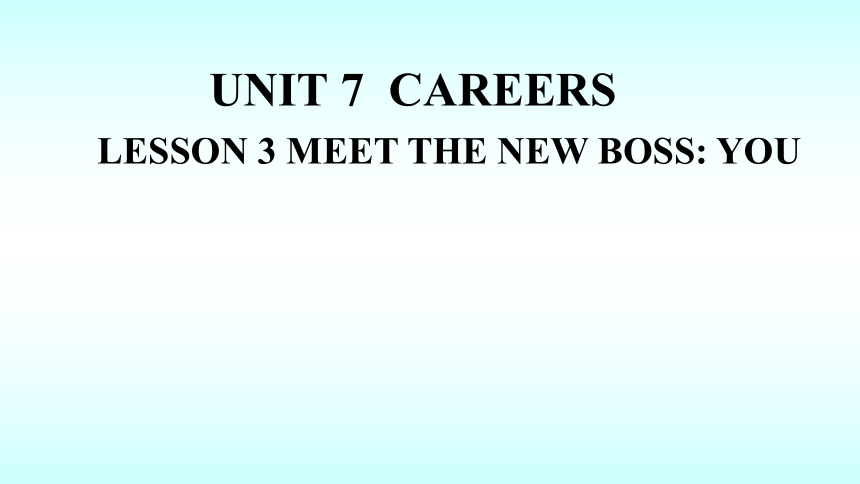 | |
| 格式 | pptx | ||
| 文件大小 | 993.6KB | ||
| 资源类型 | 教案 | ||
| 版本资源 | 北师大版(2019) | ||
| 科目 | 英语 | ||
| 更新时间 | 2023-03-17 16:04:32 | ||
图片预览



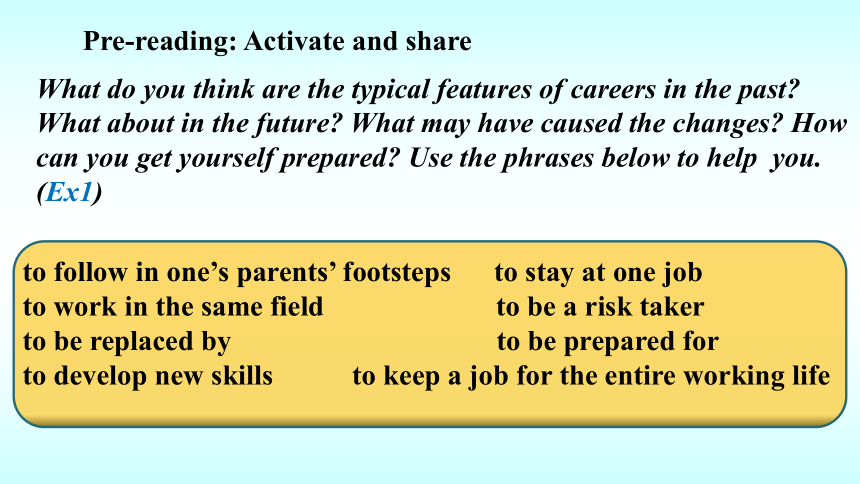


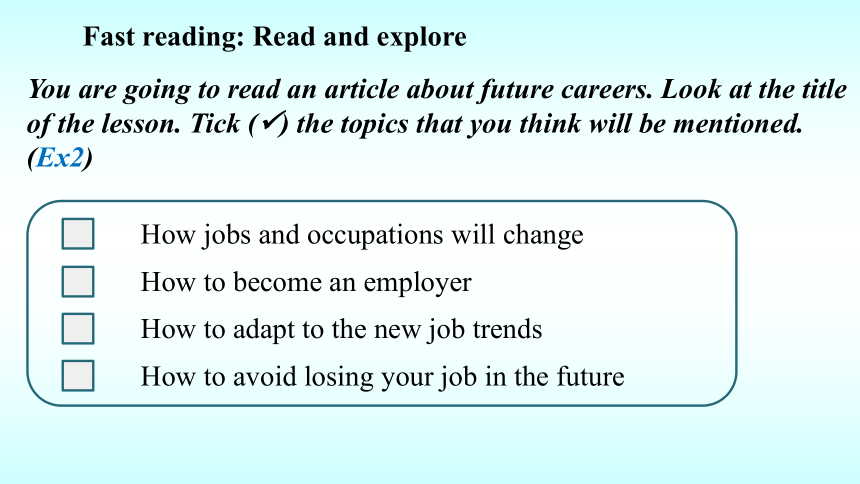


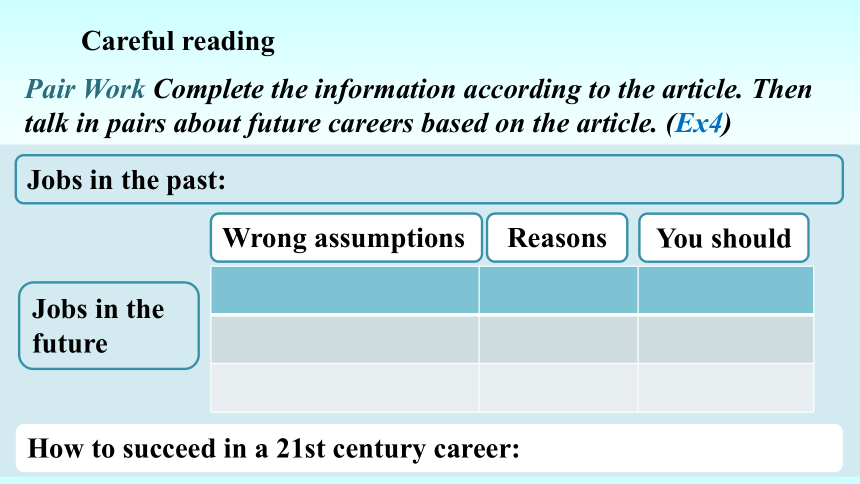
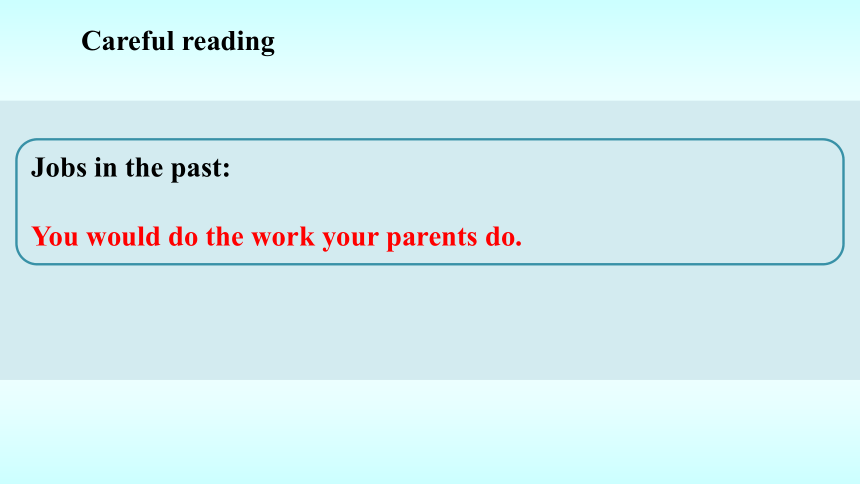
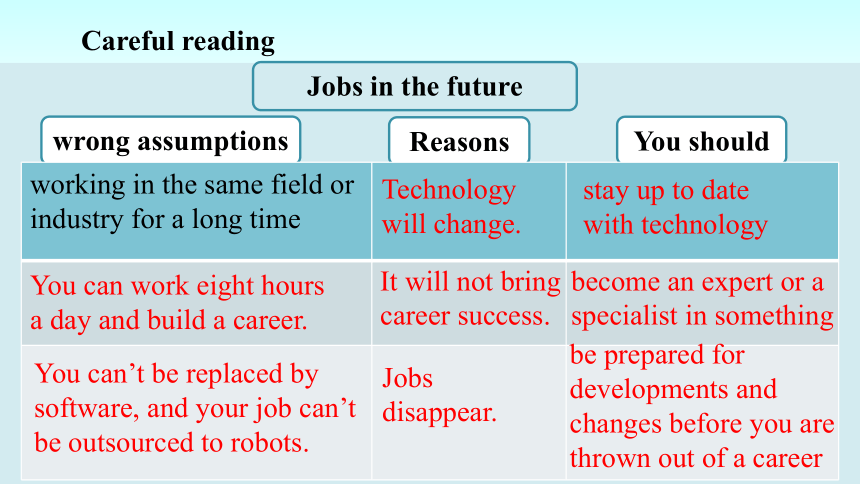
文档简介
(共32张PPT)
UNIT 7 CAREERS
LESSON 3 MEET THE NEW BOSS: YOU
目录页
contents
Pre-reading
I
Post-reading
IV
Fast reading
II
Language and grammar
V
III
Careful reading
Ⅵ
Homework
Ⅰ
Pre-reading
Pre-reading: Activate and share
What do you think are the typical features of careers in the past What about in the future What may have caused the changes How can you get yourself prepared Use the phrases below to help you. (Ex1)
to follow in one’s parents’ footsteps to stay at one job
to work in the same field to be a risk taker
to be replaced by to be prepared for
to develop new skills to keep a job for the entire working life
Pre-reading: Activate and share
Features of careers
in the past
Causes of the changes
Features of careers
in the future
Preparations needed
Ⅱ
Fast reading
You are going to read an article about future careers. Look at the title of the lesson. Tick ( ) the topics that you think will be mentioned. (Ex2)
Fast reading: Read and explore
How jobs and occupations will change
How to become an employer
How to adapt to the new job trends
How to avoid losing your job in the future
Read the article. Check your prediction. (Ex3)
Fast reading: Read and explore
Ⅲ
Careful reading
Pair Work Complete the information according to the article. Then talk in pairs about future careers based on the article. (Ex4)
Jobs in the past:
Wrong assumptions
Reasons
You should
Jobs in the future
How to succeed in a 21st century career:
Careful reading
Jobs in the past:
You would do the work your parents do.
Careful reading
wrong assumptions
Reasons
You should
working in the same field or industry for a long time
Careful reading
You can work eight hours a day and build a career.
You can’t be replaced by software, and your job can’t be outsourced to robots.
Technology will change.
It will not bring career success.
Jobs disappear.
stay up to date with technology
become an expert or a specialist in something
be prepared for developments and changes before you are thrown out of a career
Jobs in the future
Careful reading
How to succeed in a 21st century career:
develop new essential skills
Group Work Think and share. (Ex5)
1. Why does the writer think the “new boss” is “you”
2. On what points do you agree or disagree with the writer Give your reasons.
3. In paragraphs 2-4, the writer discusses some of the wrong assumptions. Why does the writer do this
Careful reading
Group Work Think and share. (Ex5)
1. Why does the writer think the “new boss” is “you”
Careful reading
The author stated clearly at the end: If you want to succeed in the 21st century career, you will have to develop new essential skills. Lifetime security from one employer is no longer certain
or even likely. The truth is that you are the boss of your career, and it is up to you to decide what you can do and how well you
can do it. This means that you are responsible for your future.
Group Work Think and share. (Ex5)
2. On what points do you agree or disagree with the writer Give your reasons.
Careful reading
Student’s own answer.
Group Work Think and share. (Ex5)
3. In paragraphs 2-4, the writer discusses some of the wrong assumptions. Why does the writer do this
Careful reading
The writer uses this way to emphasise what is wrong and invite readers to pay more attention on what he or she says about the real trend about the future. The writer discusses some of the wrong assumptions in order to make the readers reflect and realise that what common people think at present will no longer be true in the future and that they have no other choices but to walk out of their comfort zone and be their boss.
Ⅳ
Post-reading
Post-reading
Find verbs in the article to complete the collocations. (Ex6)
1. ______ in one’s parents’ footsteps 2. ______ the same profession
3. ______ the lottery 4. ______ a decent salary
5. ______ a career 6. ______ new essential skills
follow
join
win
earn
build
develop
Post-reading
Complete the sentences with the collocations.
1. John ___________________________ and became a sailor.
2. Mary is determined to ____________ in banking after she graduates from university.
3. You have to _______________________ to stand out in the competitive job market.
4. You must keep learning and work hard, instead of daydreaming to ____________.
5. He _________________ of $200,000 a year.
6. Tom ______________________ as his mother to become a teacher.
followed in his father’s footsteps
build a career
develop new essential skills
win the lottery
earns a decent salary
joined the same profession
Recognising Irony
Writers sometimes use irony (sarcasm, exaggeration and humour). We can infer that he / she is not serious and wants to draw the readers’ attention.
e.g.:
Work hard
Win the lottery
Hope for the best
Skill Builder
Skill Builder
Pair Work Tick ( ) the sentences that show irony. Then discuss your answers. Explain the examples of irony. (Ex7)
You might be lucky. These strategies might bring you a nice, comfortable life …
But most of us today have to look beyond the little box called “career”.
If you think you can work eight hours a day and build a career, think again.
If you think you can’t be replaced by software or your job can’t be outsourced to some robots on the moon, you are wrong.
Post-reading
√
√
√
Ⅴ
Language and grammar
Focus on Language: Difficult sentences
In your grandparents’ time, there was the prospect of doing the same job from graduation until retirement.
在你祖父母的时代,人们有可能从毕业到退休都做同样的工作。
解析:there be + the prospect of sth / of doing sth 有……可能性
graduation n 毕业 retirement n 退休
Page
14
Focus on Language: Difficult sentences
Most people now have no intention of following in their parents’ footsteps or even staying at one job for very long.
如今大多数人不再想子承父业,甚至不愿长时间做同一份工作。
解析:
have no intention of doing sth 不打算做……;无意做……
Page
15
Sentence Builder
Negative Expressions
unlikely to be have no intention of
not … anymore no longer hardly
1. Most people now ________________ following in their parents’ footsteps or even staying in one job for very long.
2. In fact, planning to work in the same field or industry for your entire working life just is ______ practical ________.
Focus on Grammar: Negative expressions
have no intention of
not
anymore
Complete the Sentence Builder with the expressions. (Ex8)
Sentence Builder
Negative Expressions
unlikely to be have no intention of
not … anymore no longer hardly
3. Skills you have now are ___________ enough to help you through your entire career.
4. But this is ______ a recipe for great career success.
5. Lifetime security from one employer is ________ certain or even likely.
Focus on Grammar: Negative expressions
unlikely to be
hardly
no longer
Focus on Grammar: Negative expressions
Complete the sentences with the expressions from the Sentence Builder. (Ex9)
1. High grades are _________ enough to guarantee success in a career.
2. Keeping the same job for life is ____ a realistic expectation ________.
3. The job you have today is ___________ the same as the job you’ll have in 20 years’ time.
no longer
not
anymore
unlikely to be
Focus on Grammar: Negative expressions
4. It’s ______ surprising he lost his job: he was always late and never met his deadlines.
5. The company _______________ hiring more staff because it can use robots to do the work instead.
hardly
has no intention of
Focus on Grammar: Negative expressions
unlikely to do sth 表示“不太可能做某事”
have no intention of doing sth 表示“某人或某组织没有做某事的意愿”
not … anymore 表示“不再”
no longer 表示“不再”
hardly 表示“几乎不”
VI
Homework
Homework: Express yourself
Search online and find out what jobs have disappeared in the past 10 years. What new jobs do you think will appear in the next 10 years
UNIT 7 CAREERS
LESSON 3 MEET THE NEW BOSS: YOU
目录页
contents
Pre-reading
I
Post-reading
IV
Fast reading
II
Language and grammar
V
III
Careful reading
Ⅵ
Homework
Ⅰ
Pre-reading
Pre-reading: Activate and share
What do you think are the typical features of careers in the past What about in the future What may have caused the changes How can you get yourself prepared Use the phrases below to help you. (Ex1)
to follow in one’s parents’ footsteps to stay at one job
to work in the same field to be a risk taker
to be replaced by to be prepared for
to develop new skills to keep a job for the entire working life
Pre-reading: Activate and share
Features of careers
in the past
Causes of the changes
Features of careers
in the future
Preparations needed
Ⅱ
Fast reading
You are going to read an article about future careers. Look at the title of the lesson. Tick ( ) the topics that you think will be mentioned. (Ex2)
Fast reading: Read and explore
How jobs and occupations will change
How to become an employer
How to adapt to the new job trends
How to avoid losing your job in the future
Read the article. Check your prediction. (Ex3)
Fast reading: Read and explore
Ⅲ
Careful reading
Pair Work Complete the information according to the article. Then talk in pairs about future careers based on the article. (Ex4)
Jobs in the past:
Wrong assumptions
Reasons
You should
Jobs in the future
How to succeed in a 21st century career:
Careful reading
Jobs in the past:
You would do the work your parents do.
Careful reading
wrong assumptions
Reasons
You should
working in the same field or industry for a long time
Careful reading
You can work eight hours a day and build a career.
You can’t be replaced by software, and your job can’t be outsourced to robots.
Technology will change.
It will not bring career success.
Jobs disappear.
stay up to date with technology
become an expert or a specialist in something
be prepared for developments and changes before you are thrown out of a career
Jobs in the future
Careful reading
How to succeed in a 21st century career:
develop new essential skills
Group Work Think and share. (Ex5)
1. Why does the writer think the “new boss” is “you”
2. On what points do you agree or disagree with the writer Give your reasons.
3. In paragraphs 2-4, the writer discusses some of the wrong assumptions. Why does the writer do this
Careful reading
Group Work Think and share. (Ex5)
1. Why does the writer think the “new boss” is “you”
Careful reading
The author stated clearly at the end: If you want to succeed in the 21st century career, you will have to develop new essential skills. Lifetime security from one employer is no longer certain
or even likely. The truth is that you are the boss of your career, and it is up to you to decide what you can do and how well you
can do it. This means that you are responsible for your future.
Group Work Think and share. (Ex5)
2. On what points do you agree or disagree with the writer Give your reasons.
Careful reading
Student’s own answer.
Group Work Think and share. (Ex5)
3. In paragraphs 2-4, the writer discusses some of the wrong assumptions. Why does the writer do this
Careful reading
The writer uses this way to emphasise what is wrong and invite readers to pay more attention on what he or she says about the real trend about the future. The writer discusses some of the wrong assumptions in order to make the readers reflect and realise that what common people think at present will no longer be true in the future and that they have no other choices but to walk out of their comfort zone and be their boss.
Ⅳ
Post-reading
Post-reading
Find verbs in the article to complete the collocations. (Ex6)
1. ______ in one’s parents’ footsteps 2. ______ the same profession
3. ______ the lottery 4. ______ a decent salary
5. ______ a career 6. ______ new essential skills
follow
join
win
earn
build
develop
Post-reading
Complete the sentences with the collocations.
1. John ___________________________ and became a sailor.
2. Mary is determined to ____________ in banking after she graduates from university.
3. You have to _______________________ to stand out in the competitive job market.
4. You must keep learning and work hard, instead of daydreaming to ____________.
5. He _________________ of $200,000 a year.
6. Tom ______________________ as his mother to become a teacher.
followed in his father’s footsteps
build a career
develop new essential skills
win the lottery
earns a decent salary
joined the same profession
Recognising Irony
Writers sometimes use irony (sarcasm, exaggeration and humour). We can infer that he / she is not serious and wants to draw the readers’ attention.
e.g.:
Work hard
Win the lottery
Hope for the best
Skill Builder
Skill Builder
Pair Work Tick ( ) the sentences that show irony. Then discuss your answers. Explain the examples of irony. (Ex7)
You might be lucky. These strategies might bring you a nice, comfortable life …
But most of us today have to look beyond the little box called “career”.
If you think you can work eight hours a day and build a career, think again.
If you think you can’t be replaced by software or your job can’t be outsourced to some robots on the moon, you are wrong.
Post-reading
√
√
√
Ⅴ
Language and grammar
Focus on Language: Difficult sentences
In your grandparents’ time, there was the prospect of doing the same job from graduation until retirement.
在你祖父母的时代,人们有可能从毕业到退休都做同样的工作。
解析:there be + the prospect of sth / of doing sth 有……可能性
graduation n 毕业 retirement n 退休
Page
14
Focus on Language: Difficult sentences
Most people now have no intention of following in their parents’ footsteps or even staying at one job for very long.
如今大多数人不再想子承父业,甚至不愿长时间做同一份工作。
解析:
have no intention of doing sth 不打算做……;无意做……
Page
15
Sentence Builder
Negative Expressions
unlikely to be have no intention of
not … anymore no longer hardly
1. Most people now ________________ following in their parents’ footsteps or even staying in one job for very long.
2. In fact, planning to work in the same field or industry for your entire working life just is ______ practical ________.
Focus on Grammar: Negative expressions
have no intention of
not
anymore
Complete the Sentence Builder with the expressions. (Ex8)
Sentence Builder
Negative Expressions
unlikely to be have no intention of
not … anymore no longer hardly
3. Skills you have now are ___________ enough to help you through your entire career.
4. But this is ______ a recipe for great career success.
5. Lifetime security from one employer is ________ certain or even likely.
Focus on Grammar: Negative expressions
unlikely to be
hardly
no longer
Focus on Grammar: Negative expressions
Complete the sentences with the expressions from the Sentence Builder. (Ex9)
1. High grades are _________ enough to guarantee success in a career.
2. Keeping the same job for life is ____ a realistic expectation ________.
3. The job you have today is ___________ the same as the job you’ll have in 20 years’ time.
no longer
not
anymore
unlikely to be
Focus on Grammar: Negative expressions
4. It’s ______ surprising he lost his job: he was always late and never met his deadlines.
5. The company _______________ hiring more staff because it can use robots to do the work instead.
hardly
has no intention of
Focus on Grammar: Negative expressions
unlikely to do sth 表示“不太可能做某事”
have no intention of doing sth 表示“某人或某组织没有做某事的意愿”
not … anymore 表示“不再”
no longer 表示“不再”
hardly 表示“几乎不”
VI
Homework
Homework: Express yourself
Search online and find out what jobs have disappeared in the past 10 years. What new jobs do you think will appear in the next 10 years
